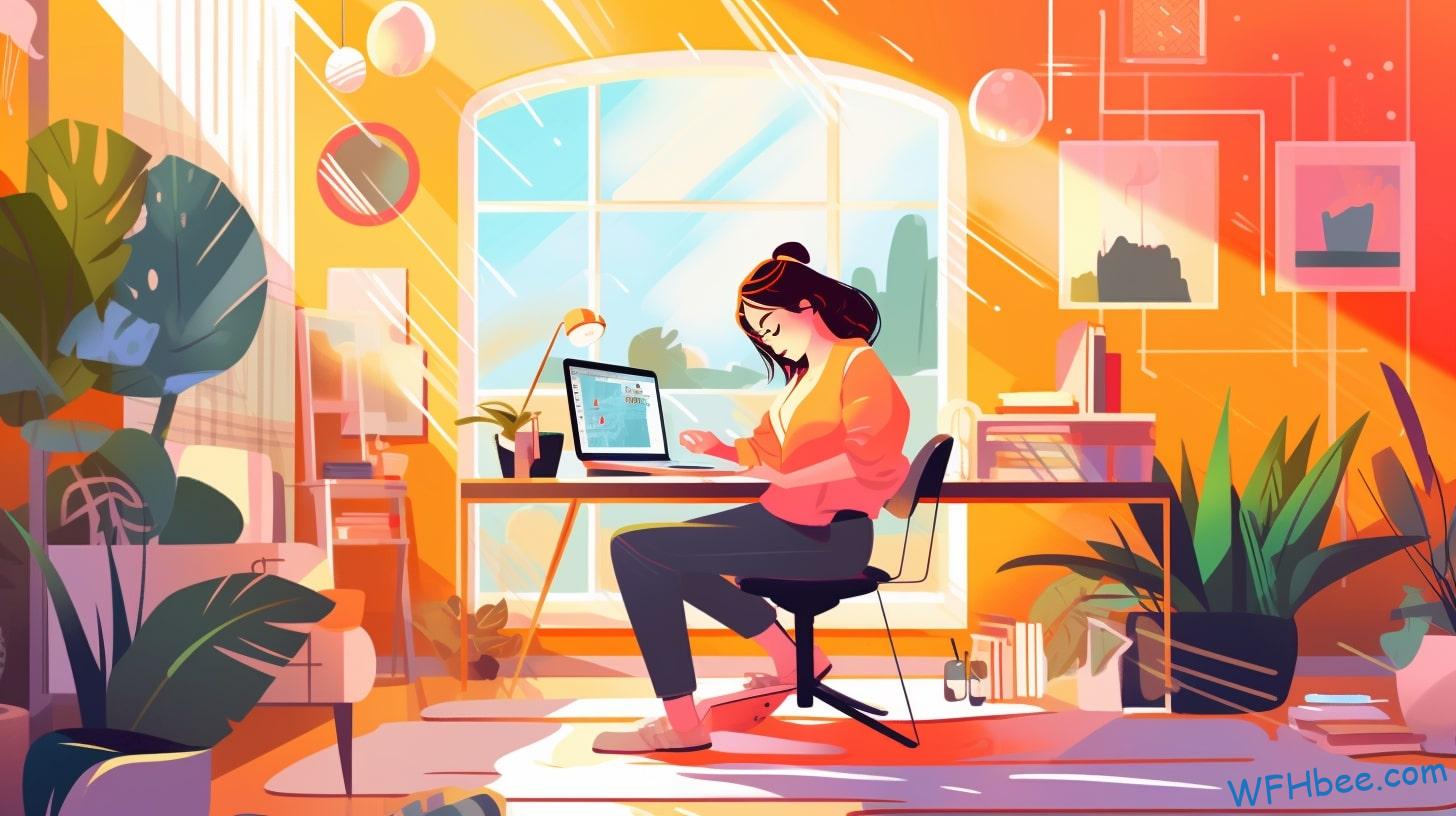Working from home has its advantages, but it also presents unique challenges. We all struggle to stay focused and productive while working remotely; however, there are certain distractions that can prevent us from doing our best work. In this article, we’ll discuss the biggest distractions when working from home and how to combat them.
If you’re like most of us who have transitioned to remote work during the pandemic, then your workspace has likely become a source of frustration rather than productivity. There’s always something competing for our attention: emails, kids running around, or even just the temptation of scrolling through social media feeds. These distractions can quickly derail any hope of getting meaningful work done in the comfort of one’s own home.
Fortunately, there are ways to manage these common issues so that we can make the most out of our time at home. Through understanding what distracts us most and putting strategies into place to mitigate those disruptions, we can reclaim control over our days and achieve greater success as remote workers. Keep reading to learn more about the biggest distractions when working from home and how to tackle them!
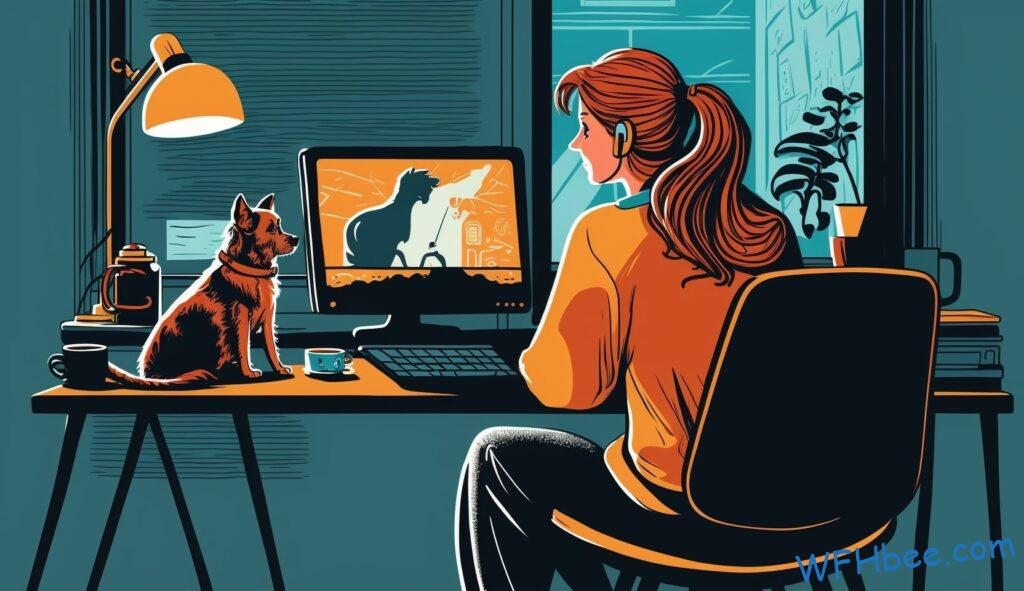
Here’s what we’ll cover:
Table of Contents
Definition Of Work From Home
Working from home has become increasingly popular in recent years, with the rise of teleworking and remote-work opportunities. It is defined as a way to perform job duties away from an employer’s physical office space, instead using one’s own home or other offsite location. This includes activities such as telecommuting from a home-office setup, working remotely on different devices, or even completing tasks while traveling.
The flexibility of this type of work brings about many benefits for employees. Working from home provides freedom to set their own hours, dress how they want, choose when and where they work, and avoid commuting times altogether. They also have access to more resources than if they had been at the office; such as having the ability to take breaks whenever needed or use any software necessary without restrictions.
At its core, working from home gives individuals autonomy over their day-to-day lives – allowing them to determine what works best for themselves and ultimately achieve better results. With these advantages come challenges that can prove distracting if not properly managed.

Challenges Of Working From Home
Working from home can feel like a double-edged sword. On one hand, it gives us the freedom to work our own hours and manage our own schedules without having to commute into an office every day. But on the other, there are many distractions that can difficultly compromise its potential benefits. It’s important for remote workers to recognize these pitfalls in order to create sustainable work-life balance and maintain their mental health while maximizing productivity.
One of the biggest challenges when working remotely is digital isolation – the feeling of being disconnected from colleagues and co-workers who normally provide support and camaraderie during the traditional 9-5 grind. This disconnection can lead to feelings of loneliness or boredom which may further impede WFH motivation and make it harder to stay productive throughout the day. Additionally, self-discipline also becomes more essential as remote teams cannot rely upon each other’s presence in an office environment to ensure that everyone remains focused on tasks at hand. Self-imposed structure must be established in order to remain accountable, complete assignments within deadlines, and ultimately achieve desired goals.
Ultimately, navigating these potential distractions requires creative problem solving by those working from home along with understanding how environmental factors affect individual productivity levels. Recognizing these elements will help foster success during this new era of remote work where collaboration between team members continues despite physical distance. By making thoughtful adjustments for comfortability and convenience, we can strive towards attaining maximum efficiency even if far away from corporate offices.
Environmental Factors That Affect Productivity
The environment in which you work plays a major role in productivity. Working from home can be especially challenging if the right conditions aren’t created for success. A dedicated home-office space allows you to have your own designated working area, separate from leisure and other household activities. It should be kept clean, organized, and free of any clutter that could serve as a distraction.
To ensure maximum comfort while working from home it is important to create an ergonomic setup with comfortable furniture and adjustable tools like laptop stands or keyboards trays. Temperature control also helps maintain concentration levels by ensuring that neither too hot nor too cold temperatures disrupt your focus. Additionally, having a well-lit space will help reduce eye strain when looking at computer screens for extended periods of time throughout the day.
These are all essential elements to consider to make sure you get the most out of each workday without feeling distracted or overwhelmed. By creating a healthy and productive environment to do remote work, you increase the chances of staying focused on tasks at hand and managing distractions more effectively.
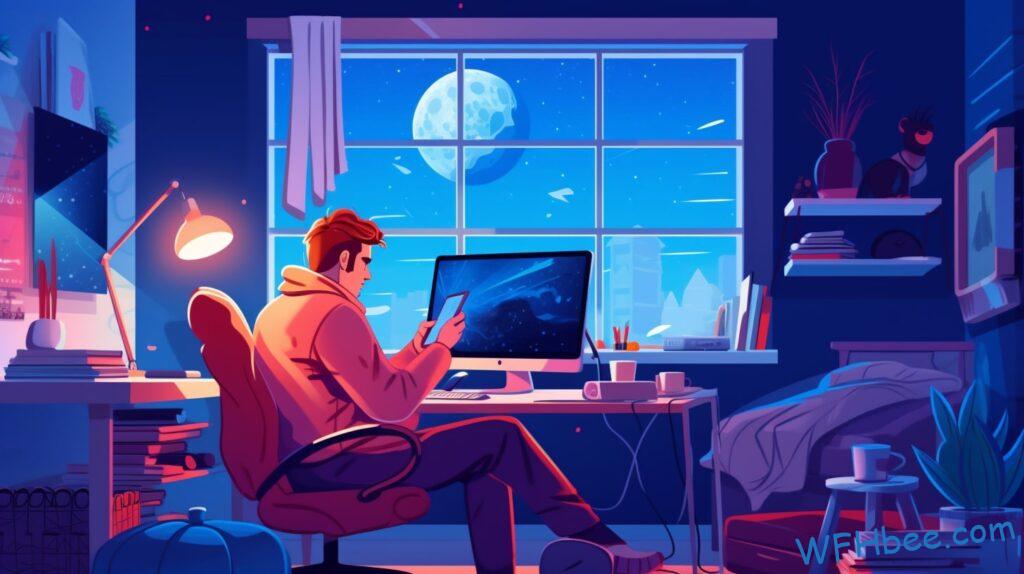
Common Distractions At Home
The environment at home can be a minefield of distractions. Visualizing it as an obstacle course to productivity, with each step representing a different distraction, is the best way to approach working from home.
Firstly, there are children and pets that demand attention while you’re trying to focus on work. They may seek out your attention by playing or barking during conference calls, jumping onto furniture near you, or running around in circles right next to you.
Secondly, roommates can also distract you if they don’t understand your need for quietness when working. Furniture such as chairs and couches that aren’t comfortable enough may cause your body ache after sitting down for too long without moving. Additionally, clutter all over the house can create visual noise making it hard to concentrate on tasks.
Overall these environmental factors make up some of the biggest common distractions when working from home:
- Children & Pets
- Roommates
- Furniture & Clutter
These distractions come from within our own living space which makes them difficult to avoid but necessary steps should be taken in order to remain productive. Interruptions from family and friends outside of the household can add further challenges if not managed properly.
Interruptions From Family And Friends
Family and friends can be quite the distraction when working from home. Whether it’s a knock on the door, or a sudden phone call, these interruptions can easily take away your focus. If you’re lucky enough to have family or close friends living in the same house as you, chances are they will not understand that you need space to work. It is important for them to recognize that even though we are at home, our WFH environment requires us to be focused and productive just like any other job.
If there are children in the house, their noise level and energy levels can also prove to be distracting while trying to concentrate. Even if it is hard at times, try establishing some boundaries with both family members and kids so they know when you need uninterrupted time for work – this could mean closing your office door during certain hours of the day so no one bothers you. Setting clear expectations upfront helps reduce distractions as everyone knows what’s expected of them.
Friends too may not understand why you need privacy while working from home due to all its perks – such as being able hang out anytime, anywhere! As much as possible however try sticking to regular work hours with set breaks throughout the day where you can catch up with friends and make sure communication around this schedule is clear with those closest to you-it’ll help keep distractions at bay!

Technology Issues
Technology is a huge distraction when working from home. Poor internet connection, tech problems, inadequate tools and software glitches can derail productivity levels in an instant. Device malfunctions can lead to hours spent troubleshooting rather than getting the job done. In addition, with the rise of social media usage, it has become increasingly easy to be drawn away from completing tasks efficiently and quickly.
Having access to so many forms of technology at our fingertips makes us more vulnerable to distractions that take us off task. We are surrounded by endless opportunities for procrastination such as browsing through online stores or watching videos on YouTube. It also keeps us updated about people’s lives which could distract us further if we let ourselves get sucked into their stories instead of focusing on our own tasks.
The problem does not stop there—we may even feel overwhelmed due to all the notifications streaming in constantly from emails, messages, and other alerts. This bombardment of information requires time management skills that most lack; hence why these distractions have become prevalent while trying to work remotely.
To effectively navigate this digital age, one must learn how to balance between focus and freedom while working from home without succumbing too much to distractions. Social Media
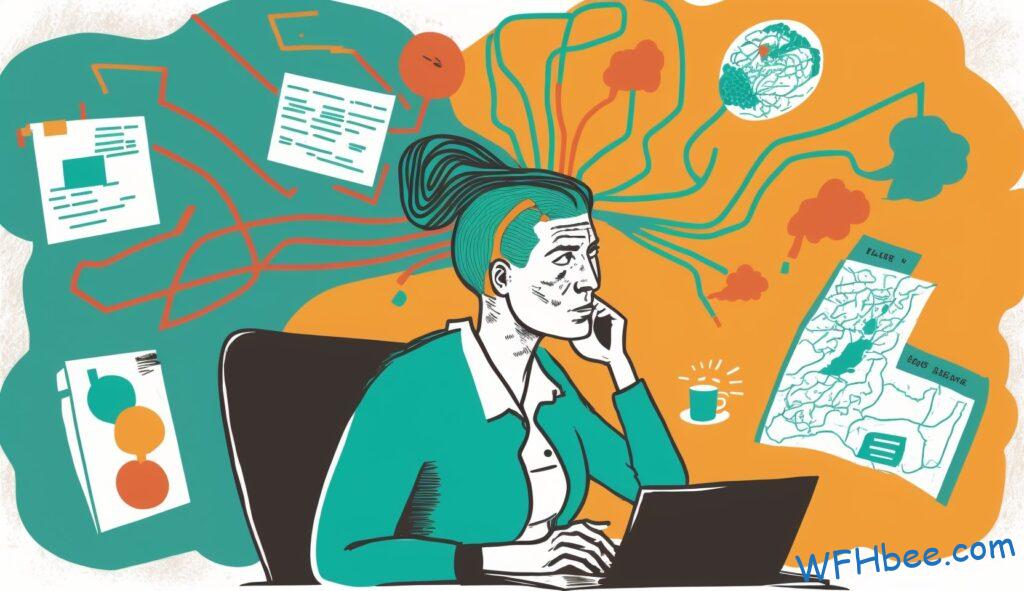
Social Media: A Huge Remote Working Attention Steal
Social media is one of the biggest distractions that come with working from home. With easy access to platforms like Facebook, Instagram, and Twitter right at your fingertips, it can be very tempting to take a break and scroll through your news feed. It’s no surprise that social media addiction has become more prevalent in recent years as people are constantly checking their accounts throughout the day.
The impact of this type of procrastination can be detrimental to productivity levels when you’re trying to work from home. It’s important to create boundaries between work time and personal time so you don’t fall into the trap of being distracted by non-work related activities. Developing effective social media workflows will also help you stay on task and avoid getting sucked into an endless cycle of scrolling through feeds.
One way to minimize social media distractions is by setting specific times for yourself each day where you limit or completely refrain from browsing these sites. This could be during certain hours while you’re working or even after a certain hour in the evening – whatever works best for you! Doing this will give your mind some much needed space away from all the noise online which can help keep your focus sharpened towards what matters most: finishing tasks efficiently and effectively.

Unhealthy Eating Habits When Telecommuting
When it comes to working from home, unhealthy eating habits can be a major distraction. Poor nutrition choices often lead to overeating and junk food cravings, which take away time better spent on work tasks. Binge-eating is another distraction that many people face when they are confined to their homes for long periods of time; it’s easy to become overwhelmed by stress and turn to food as comfort.
It also doesn’t help that snacks tend to be easily accessible while in the same place where one works. This makes it difficult not to indulge in unhealthy treats instead of staying focused on completing assignments or projects. Furthermore, loneliness can drive individuals towards emotional eating in order to fill an internal void. Regardless of why someone might be reaching for these foods, they will eventually have an effect on productivity levels if left unchecked.
The effects of this type of behavior go beyond just being distracted at work; poor dietary habits can result in health issues down the road too. It’s important for those who work from home to make conscious decisions about what goes into their bodies so that both physical and mental wellbeing remain prioritized. With proper self-discipline, anyone has the capability to stay motivated and productive despite any distractions caused by unhealthy eating habits. Moving forward, lack of exercise poses another risk for those who are now used to spending more time indoors than ever before.

Lack Of Exercise Working Virtually
The unhealthy eating habits discussed in the previous section can be further compounded by a lack of exercise, which is another major distraction while working from home (WFH). With no commute and fewer social obligations, it’s easy to forego physical activity. This can lead to a sedentary lifestyle that not only affects productivity but also impacts overall health.
Fortunately, there are many ways to get some exercise at home without having to join an expensive gym or fitness class. Home workouts such as stretching, yoga, Pilates, and HIIT exercises can easily fit into any WFH schedule. Even simple activities like walking around the house or doing chores can help keep muscles active during extended periods of sitting down.
It’s important for those who work from home to make time for physical activity throughout the day. Not only does this boost energy levels and concentration, but regular exercise has been proven to reduce stress and improve mental wellbeing too. Taking small steps towards incorporating more movement into one’s routine will go a long way in helping maintain both physical and mental health whilst working remotely. Moving on to the next topic: Poor Time Management Skills…
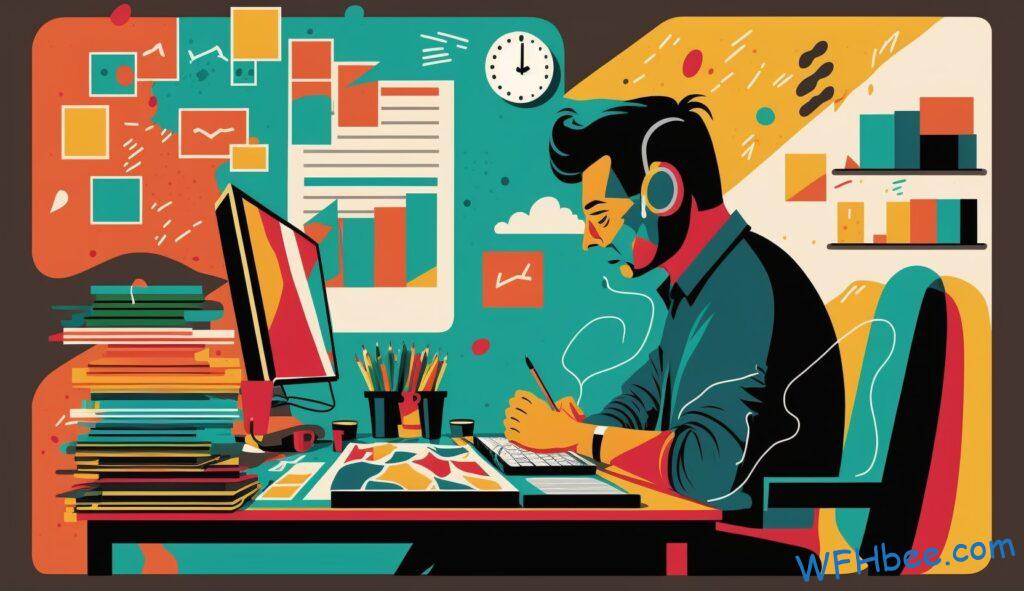
Poor Time Management Skills WFH
Working from home can be a great way to save time, but it also comes with its own set of distractions. One of the biggest is poor time management skills. Without somebody else telling you what tasks need to be completed and when, people may find themselves procrastinating or struggling to stay focused on their work.
Developing effective time management techniques is essential for anyone who works remotely. People should plan out their days ahead of time so they know exactly what needs to be done and by when. Setting small goals throughout the day gives structure and purpose that can help keep productivity levels high. Additionally, tracking how long each task takes will give individuals an idea of how much they’re able to accomplish in a given amount of time, allowing them to better manage their workflow and prioritize necessary tasks.
Automating repetitive processes, setting reminders for important deadlines, and taking regular breaks are just some examples of strategies that can help make managing working from home easier and more efficient. With proper planning, focus, and dedication, working from home doesn’t have to be overwhelming or distracting – instead it could offer a sense of freedom like no other job before. Now let’s learn about the pitfalls caused by procrastination…

Procrastination
Take the case of Joe, a freelancer who works from home. Although he had an impressive portfolio and a thriving business model, Joe was having difficulty staying productive due to his tendency to procrastinate. He would often find himself avoiding tasks or putting them off until the last minute. As a result, he started feeling overwhelmed and anxious about his workload.
In order to combat this issue, Joe implemented various distraction techniques such as taking frequent breaks or listening to music while working. While these methods initially improved his productivity levels, they eventually became part of the problem as well – leading him into even more procrastination. To stay on top of things without overworking himself, Joe began utilizing some simple yet effective productivity hacks like setting realistic deadlines and breaking down large projects into smaller chunks so that it seemed less daunting. By doing so, he was able to stay focused and motivated towards completing his tasks in time.
It is important for those working from home to recognize their own tendencies when it comes to procrastinating and take proactive steps in addressing them accordingly. This could involve anything from implementing certain organizational systems or cutting back on distractions in order to maximize one’s efficiency and achieve better results with less effort expended. Transitions are key in ensuring that one does not get sidetracked by other seemingly pressing matters but stick with what needs getting done first before moving onto something else. With proper planning and dedication, anyone can effectively manage their workloads at home despite common distractions like procrastination.

Overworking
Overworking is a tremendous problem that is related to distractions when working from home. Let me explain: It’s so easy to get sucked into the idea that you have all day to work on your projects, but this can quickly lead procrastination and, as a result, long hours of overtime to finish the tasks. Working from home without setting boundaries for yourself can easily turn into overworking, leaving you feeling exhausted and unable to focus properly. This means less productivity than if you had stuck with a regular schedule in an office setting.
One way to combat this problem is by creating structure for yourself during the day. Set specific times for breaks throughout the day and hold yourself accountable by scheduling them out ahead of time. Make sure not to forget about lunchtime; take at least thirty minutes away from your desk every day so that you don’t become too overwhelmed or burned out while working remotely. Additionally, set reasonable expectations for how much work needs to be done each day instead of trying to cram everything in within one eight-hour period–this will help prevent exhaustion and allow more freedom in the long run!
At the same time, it’s important not fall victim to procrastination either: make sure that any “breaks” are truly necessary ones taken only occasionally otherwise they could just end up wasting valuable productive time. Find what works best for you personally – whether that’s taking short five-minute pauses here and there throughout the day or dedicating larger chunks of time strictly dedicated towards rest – balancing hard work with self-care is key! Moving onto unnecessary breaks…
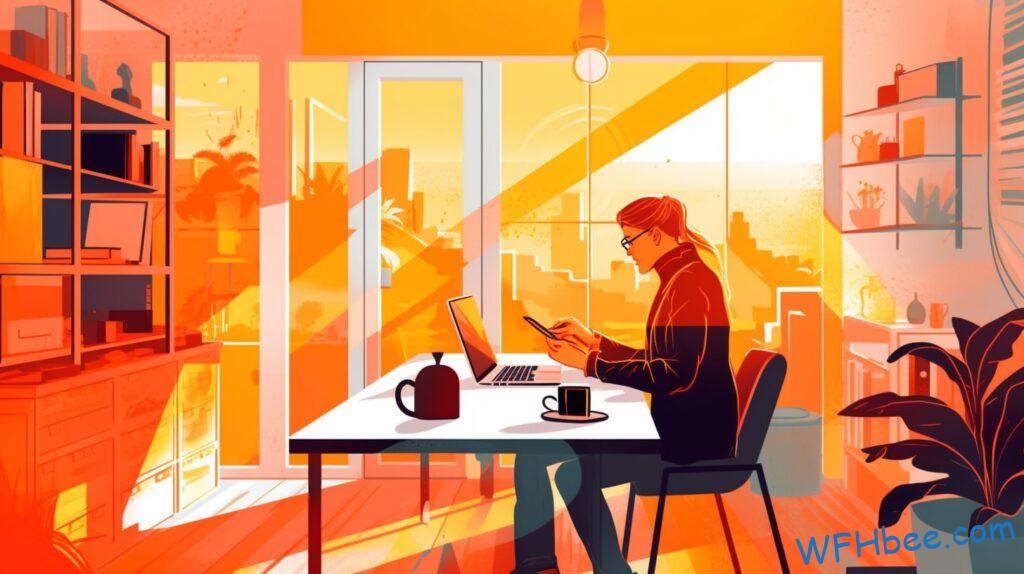
Unnecessary Breaks
Unnecessary breaks can be one of the biggest distractions when working from home. While taking a break is essential for productivity, too many unscheduled breaks hinder progress and sap motivation. Unplanned or unproductive WFH (work from home) breaks can add up to an enormous amount of wasted time.
It’s easy to get sidetracked with trivial tasks that are unrelated to work when you have no supervisor at your back. Those “quick” five-minute breaks often turn into 30 minutes before you know it – leaving less time for what really matters. It can also become difficult to transition back into the mindset necessary to accomplish your goals after such distractions pile up.
The best way to avoid this cycle of distraction is by scheduling productive breaks in advance, so that you remain focused on completing important tasks throughout the day without getting derailed by unneeded procrastination. This will help ensure that you stay motivated and productive while working remotely – allowing you to reap the benefits of more freedom and flexibility as well! With a little bit of discipline and planning, unnecessary WFH breaks do not have to be detrimental to success anymore.
Noise pollution is another common problem faced by those who work from home…

Noise Pollution
Noise pollution is one of the biggest distractions when working from home. Unwanted noise can come from a variety of sources, like loud neighbors, traffic or construction outside your window, and other external noises that are difficult to control. For example, if you live in an apartment complex or densely populated area, it’s likely that there will be plenty of chatter coming through your walls as people go about their day-to-day activities.
To combat this problem, investing in noise-cancelling headphones or soundproofing materials is a good option. These products can help block out unwanted sounds so that you can focus on what you need to do without being distracted by background noise. Additionally, hearing protection devices such as earplugs and even custom molds provide great levels of comfort for those who work in noisy environments for long hours at a time.
If you don’t want to invest in expensive soundproofing solutions, creating a makeshift sound barrier with blankets and furniture could also help reduce the amount of outside noise entering into your workspace. Similarly, setting up white noise machines or sound masking systems can help create soothing ambiance while eliminating extraneous sounds from disrupting your productivity.
Working from home presents its own set of challenges but with the right strategies and mindset, these obstacles can easily be overcome. By taking proactive steps to protect yourself against potential distractions due to excessive noise pollution — whether through purchasing specialized equipment or simply utilizing household items — it’s possible to maintain focus regardless of where you’re located. With some creativity and effort, the main distractions when working from home can effectively be eliminated and replaced with calmness and concentration instead!

Final Answer: The Main Distractions WFH
Working from home can be a great experience, but it’s not without its distractions. The most common WFH distractions include social media, email notifications, household chores, and TV shows. As an employee working remotely, these distractions can get in the way of productivity and make it difficult to focus on your work. So how do you deal with all these potential pitfalls?
The key is finding ways to reduce or eliminate distractions. This could involve turning off notifications for emails, setting up quiet workspaces away from TVs and other noise-making devices, creating strict deadlines for yourself, or taking regular breaks to clear your head. Additionally, if possible try to set designated times when you will check emails or take phone calls so that you can stay focused during those periods without interruption.
When working from home there are no guarantees against getting sidetracked or feeling overwhelmed by too many tasks. However, by being mindful of the potential distractions and employing strategies like those mentioned above, you’ll be able to find ways to keep your attention where it needs to be – on the task at hand!
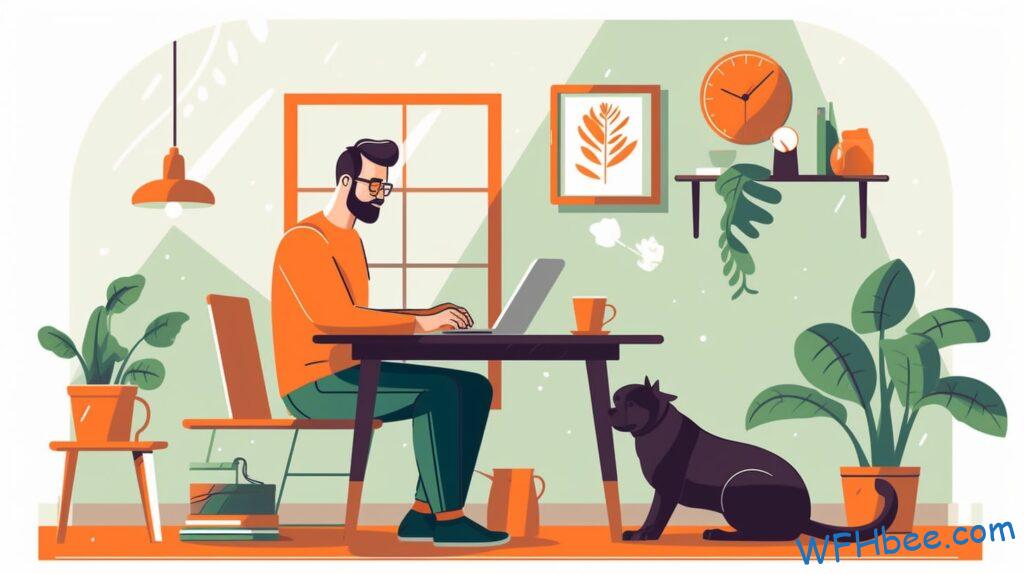
Conclusion
Working from home has its challenges, but it also comes with many rewards. Distractions are one of the biggest issues people face while working remotely. The main distractions that get in the way of productivity at home include environmental factors, like noise pollution; interruptions from family and friends; overworking; and taking too many unnecessary breaks.
Although these obstacles can be difficult to overcome, by being mindful of what’s causing them and making a plan to avoid them, you will soon find yourself sailing through your work days as if you were in an office.
It is important to remember that ‘wherever you go, there you are’ – so create an environment designed for success and focus on developing habits that promote productivity no matter where you are. With this knowledge, nothing can stand in the way of achieving success!
Author: Robin Borg
Hi, I’m Robin. I have been working from home at least one day a week during all of my adult life. I have a background in research and data science. Get to know me better in the About page.







